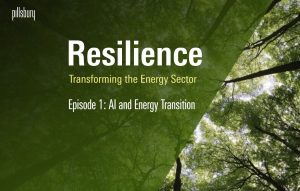As we covered previously, President Trump has made clear that the U.S. is focused on increasing investments into building, scaling and speeding the development of AI infrastructure and data centers in the U.S., and Big Tech is responding in kind.
Articles Posted in Artificial Intelligence (AI)
Something Biden and Trump Can Agree On?—Data Centers, AI and Energy Generation
 Last week, on one of his final days in office, President Biden signed an executive order aimed at boosting the development of energy facilities and data centers for artificial intelligence (AI) technology. Executive Order 14141 directs the secretaries of Defense, Energy and the Interior to lease sites on federal land to private sector companies for the purpose of building data centers and energy generation and transmission facilities. Noting that AI technology has become, and is expected to remain, a “defining technology of our era,” and that both economic and national security risks could arise if the United States falls behind in the race to build AI infrastructure, the Order seeks to reduce regulatory barriers to these projects by speeding the permitting process, and ambitiously seeks to enable construction at these federal sites to commence by January 1, 2026.
Last week, on one of his final days in office, President Biden signed an executive order aimed at boosting the development of energy facilities and data centers for artificial intelligence (AI) technology. Executive Order 14141 directs the secretaries of Defense, Energy and the Interior to lease sites on federal land to private sector companies for the purpose of building data centers and energy generation and transmission facilities. Noting that AI technology has become, and is expected to remain, a “defining technology of our era,” and that both economic and national security risks could arise if the United States falls behind in the race to build AI infrastructure, the Order seeks to reduce regulatory barriers to these projects by speeding the permitting process, and ambitiously seeks to enable construction at these federal sites to commence by January 1, 2026.
AI Needs Critical Materials, Fast! But From Where?
Critical materials—the collective term for metals and minerals essential for all kinds of advanced technology and clean energy—are vital to the growth of artificial intelligence (AI), which has become pervasive in everyday life. AI hardware relies on familiar elements like aluminum, silicon and copper, and unfamiliar elements like gallium, germanium, palladium and neodymium to support the computational power, data transmission, and cooling systems required to process vast amounts of data at high speeds.
Resilience: Transforming the Energy Sector – AI and the Energy Transition | Episode 1 (10.7.24)
 Colleague and host Shellka Arora-Cox recently sat down with Sandhya Ganapathy, CEO of EDP Renewables North America, to discuss the fascinating intersection of the energy transition and artificial intelligence.
Colleague and host Shellka Arora-Cox recently sat down with Sandhya Ganapathy, CEO of EDP Renewables North America, to discuss the fascinating intersection of the energy transition and artificial intelligence.
Big Data Meets Big Green: Data Centers and Carbon Removal Compete for Zero-Emission Energy
 Artificial intelligence, data centers, carbon removal and zero-emission power may sound like a winning line (plus the Free Space) on a 2024 Buzzword Bingo card. But the concepts have come into dramatic real-world tension as private and public actors seek to accommodate the digital and environmental imperatives for green energy.
Artificial intelligence, data centers, carbon removal and zero-emission power may sound like a winning line (plus the Free Space) on a 2024 Buzzword Bingo card. But the concepts have come into dramatic real-world tension as private and public actors seek to accommodate the digital and environmental imperatives for green energy.
After years of fairly stable demand, punctuated by declines during the pandemic and economic slumps, electricity demand is projected to double by 2050. A principal cause is the rapid expansion in the power needed to energize and cool servers amid explosive growth in the number and size of data centers, crypto miners, and other point sources of computation. Data centers were 3% of U.S. demand and are projected to be up to 9% or more by 2030; AI will drive a 160% surge in data center demand by 2030. A commentator notes, “We haven’t seen [growth like] this in a generation.” Continue Reading ›
Data Center Investment Opportunities
 Due to the rapidly increasing amount of data generated and consumed on the internet, an opportunity exists for commercial real estate investors, lenders, developers, green energy providers and others to develop data center facilities. Social media, streaming services, cryptocurrencies, the internet of things and other innovations have resulted in data center supply shortages. AI technologies, such as ChatGPT, require vast amounts of computing power. And, as AI demands grow, data center operators need to adapt the infrastructure to address cooling requirements in a sustainable manner.
Due to the rapidly increasing amount of data generated and consumed on the internet, an opportunity exists for commercial real estate investors, lenders, developers, green energy providers and others to develop data center facilities. Social media, streaming services, cryptocurrencies, the internet of things and other innovations have resulted in data center supply shortages. AI technologies, such as ChatGPT, require vast amounts of computing power. And, as AI demands grow, data center operators need to adapt the infrastructure to address cooling requirements in a sustainable manner.
Real Estate & Construction News Roundup (04/18/23) – Clean Energy, Critical Infrastructure and Commercial Concerns
In today’s roundup, construction waxes and wanes, energy goals are set, and concerns abound for the commercial real estate market in the United States and Europe.
AI Systems and the Real Estate Industry
 Artificial intelligence (AI) systems captured considerable attention with the release of a large language chatbot, ChatGPT, by OpenAI, in November of last year. On March 14, OpenAI unveiled GPT-4, a more powerful “multimodal” chatbot responding to both text and images. And, on March 21, Google launched its conversational computer program, Bard, to compete with GPT-4. These chatbots allow users to initiate detailed queries or requests and receive prompt responses in complete sentences. Users are not forced to scroll through a list of results like those produced by search engines and follow-up questions can be asked. AI systems have been touted for many years and these new breakthroughs may drastically change the way that we create content.
Artificial intelligence (AI) systems captured considerable attention with the release of a large language chatbot, ChatGPT, by OpenAI, in November of last year. On March 14, OpenAI unveiled GPT-4, a more powerful “multimodal” chatbot responding to both text and images. And, on March 21, Google launched its conversational computer program, Bard, to compete with GPT-4. These chatbots allow users to initiate detailed queries or requests and receive prompt responses in complete sentences. Users are not forced to scroll through a list of results like those produced by search engines and follow-up questions can be asked. AI systems have been touted for many years and these new breakthroughs may drastically change the way that we create content.
 Gravel2Gavel Construction & Real Estate Law Blog
Gravel2Gavel Construction & Real Estate Law Blog


